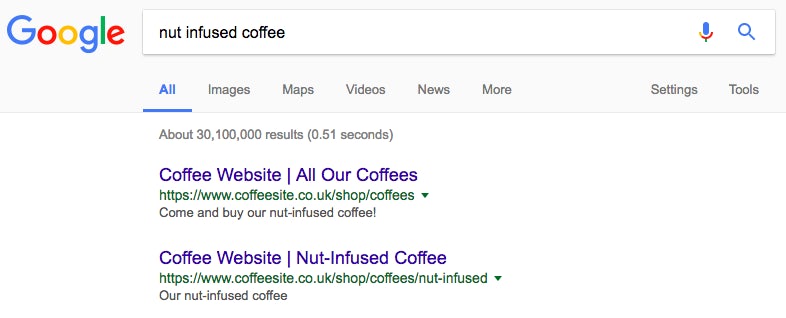The notion that multiple pages targeting the same keyword can hinder your SEO efforts is often something people don’t expect when writing their blogs and content. It makes sense right, why would you not want multiple attempts to rank higher for your desired keyword? Surely you’ve got to get it right once – unfortunately not. It can cause major issues across your site if not assessed correctly. Unlike what Drake may say, however, if you’re reading this, it is definitely not too late.
Let’s imagine you produced some top-quality content on nut-infused coffee beans and you see this has produced the engagement and interaction you desire. You then decide to make further content around nut-infused coffee beans and thus begins your problem. With all this content around the same subject matter and specific keyword of ‘nut-infused coffee beans’, you are putting your site at a disadvantage; these pages are now competing against each other. Your CTR will decline, as will that page’s authority as the once consolidated nut-infused coffee bean content has been dispersed into weaker smaller forms. Search engines will choose one of these pages to rank higher but this content has now been diminished as your site turns into Hannibal Lecter and begins feasting. Much like the FBI, you need to use your detective skills to hunt down this cannibal, and so begins the SEO investigation.
What impact can keyword cannibalisation have?
The crafty cannibal can impact your website through a variety of manners;
- Reduced conversion rate
- Reduced page authority
- Implies your content is thin
- Hampering crawl budget
- Confusing user experience
- Spreading backlinks across multiple pages
How can I find Hannibal?
Being a sly criminal, Hannibal the Keyword Cannibal will be on the run and sometimes may be annoying to find. Keyword tracking tools such as STAT will allow you to see what pages are ranking for specific keywords. You can then monitor fluctuations whereby different pages are ranking for the same keyword. Once you’ve noted these down, you’ve found your problem pages.
Another method is to get forensic; use “site:URL + keyword” search parameter to see what pages are ranking for the keyword, or potential problem pages.
Use your existing database! The FBI will be using facial recognition and all available information to find the cannibal(s). You have a sitemap. Try a ctrl +f to search for your keyword to see any problem pages targeting the same keyword.
How can I stop Hannibal?
If you’ve had this issue for a while and you have a lot of content all on the same topic, it’s time to get the 301 redirects loaded. Before you go about redirecting all your nut-infused coffee bean pages to one, ensure you have chosen the right page. Bear in mind that search engines may not have chosen the best page to rank higher as can be seen in this mock-up example here, where the relevant category page is not ranking.

Assess which page offers the most engaging content and is the most useful to the user. Perhaps the second page you created on nut-infused coffee beans is the most informative and links out to other resources on your site, overall it’s a better experience. Consider how many sessions the page is getting, the conversion and bounce rate in Google Analytics and you will have a good insight into which page is most valuable.
This should then be the page that the 301 directs are pointing to. This will tell search engines and users that this page is the reformed criminal, no longer a cannibal. Remember, if you are redirecting category URLs, ensure the sub-categories are above the main category redirects in the htaccess file. If you want to make your life easier you can use plugins like Redirection for WordPress.
What if I don’t want to redirect some great content?
Perhaps some of your content was useful in the investigation and provides a different experience for the user that it perhaps shouldn’t be cannibalising, but shouldn’t be redirected either.
You can then try and re-optimise it for another keyword to make the most of your existing content. This is essentially an informant in the FBI investigation who has turned on Hannibal – great find.
What can I do to keep Hannibal from returning?
To prevent the Hannibal sequel from happening (seriously, Hannibal Rising from 2007 is atrocious) and waging another cannibal battle on your website, there are best practices you can follow to prevent keyword cannibalisation in future. A good keyword targeting structure and plan will help you create content that does not overlap or compete.
Variations of the keyword should link back to the original, so if you did nut-infused coffee bean recipes, for example, that should then point back to the main hub of the topic.
Canonical tags
Canonical tags can help with a variety of keyword cannibalisation issues, let’s take query strings for example. Keyword cannibalisation can occur when search results are competing against each other for the main landing page for products. If ‘British coffee beans’ is your targeted main category page with products in it, the filters, if not set up correctly with canonical tags, may be creating query string URLs that then could cannibalise against the main page.
If you plan your future content appropriately you can ensure there is no overlap between pages and keep Hannibal locked up for good. And finally, if you haven’t seen Silence of the Lambs with Anthony Hopkins in – do set aside some time this weekend.



